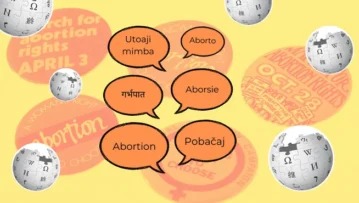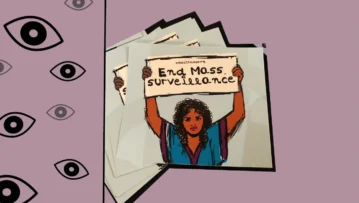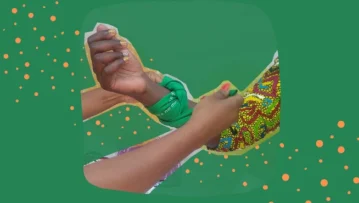
We write with gratitude to our ancestor, Audre Lorde, who reminded us that “revolution is not a one-time event”
What is the context?
Our feminist collective has been holding space for each other, our friends, and our communities across the world, as we have been witness to the unfolding genocide in Gaza. As we write this, in the week of 11th December 2023, over 18,272 people (two-thirds of whom are children and women) have been murdered by Israeli forces, while Gaza is being razed to the ground by the dropping of over 25,000 tonnes of explosives, the equivalent of two nuclear bombs. Israel – supported by western governments, including the US, UK, and Germany – sees this as justifiable retaliation for what is also a tragedy: the murder on October 7th of 1,200 Israelis by Hamas.
And in other parts of the world, at the same time, other horrors of war and genocide have also continued to unfold: in Sudan, in the Democratic Republic of Congo, in Myanmar (as examples in a painfully non-exhaustive list).
We write this in solidarity with the people of Palestine and beyond at this moment in time. But it is also an offering in full transparency, of our reflections to try and express ongoing solidarity in practice. It is an account of how we have tried to show up for our communities, for each other, as we have tried to connect our liberations, so that our solidarity is beyond words, it is in action. As we are learning, solidarity in practice is messy, it is imperfect, it is dynamic, and ultimately, it can only be an invitation to seek radical love and radical honesty together: to figure out the many ways in which we put our hearts, our heads, our bodies, and our souls on the line for each other. Not just for today, but for our shared tomorrows.
What do we ask ourselves at this moment?
All of us in our collective come from different histories and ongoing experiences of violence, conflict, and war, from every populated continent of the world. We have had to hold our own contexts of rage and grief in different parts of the world, while centering the pain of our friends and their families in Palestine and in the diaspora, as they have lost entire generations of their community. Simultaneously, even as we know there is no equivalence, we mourn deeply the loss of lives in Israel.
Here are some of the questions we have been asking ourselves and each other, as we have been holding, reflecting, and connecting:
- What is different about this particular moment in time and why does solidarity feel like it’s under public and personal pressure?
- What are the root causes of these horrifying cycles of violence? How do we understand the asymmetry of structures and processes of power and oppression while not seeing them as simple and static binaries?
- How do we critique, challenge, and resist the violence of states, corporations, and the military industrial complex, without dehumanizing people?
- How do we express solidarity when we know there are likely to be (negative) repercussions? How do we accept our fears even as we act?
- What do we have to say, do, and offer that is helpful, not harmful, particularly as feminists challenging Big Knowledge and Big Tech? To whom?
- What does solidarity in practice look like over time, not just as a one-time event?
Who and what did we learn from?
This is a set of resources we have learned from and will continue to expand as we learn and do further. Please send us what you’ve found most helpful as you have navigated this difficult time.
What do we understand?
As a feminist collective rooted in the liberation movements of oppressed communities of the Global Majority World, we understand that present-day violence cannot be detached from its colonial past. Israeli occupation in the region has long attempted to erase the histories of Palestinians and violently displace and dispossess them, eradicating their ways of being, their lands, and their knowledges. We, who were not meant to survive, know that the ancient struggles of people against their oppressors have no borders: they have memory.
We know from our histories, knowledges, and memories that epistemic violence — the violence that destroys certain knowledges and valorizes others — has been central to systems of oppression. It has been used for centuries to justify wars, the occupation of territories, the exploitation of our planet, and the eradication of communities, families, and nations. For centuries, Big Knowledge institutions (universities, museums, and other memory institutions such as academia and publishing in the Global North) have propagated ideologies that justified these systems, and legitimized violence and erasure: for instance, the fictitious and false construct of racial superiority and inferiority to justify the horrors of colonization or the Holocaust. For the politics of decolonization to reflect in practice at this moment, institutions must now center and amplify Palestinian people and their knowledges, histories, and truths.
These intersecting systems of oppression, as well as the structures and consequences of colonial capitalism, are also embedded in Big Tech. Technology companies are at the core of initiating and maintaining digital colonialism, as well as propagating violent content and hate speech that dehumanizes Palestinians.
This has materialized in multiple ways in the current context: Israeli tech companies have tested without consent on Palestinians, AI is being used to indiscriminately widen bombing targets, civil telecommunications infrastructure and access to the internet have been severely limited, some Instagram profiles have shown “Palestinians” translated as “terrorists”, and there have been ongoing anti-Palestinian biases in algorithmic systems. Alongside this, there has been a systematic crackdown, criminalization, and censorship of organizations, collectives, and people in/from Palestine – as well as allies – in their expressions of solidarity with the Palestinian people. But repression cannot stop resistance: Arabic-speaking users are using keyboards to write in a way that can’t be predicted to avoid shadowbanning, and week after week, the people of the world have been coming together to call for an end to the genocide.
What do we do next?
We join our voices together with all those who are demanding a stop to Israeli state-led colonial crimes and genocide committed against Palestinians, and the end of occupation, apartheid, and colonization of Palestinian people and lands.
As we resist, we also reimagine: we are committed to pushing for futures of connected and collective liberations that are not based on repeated histories of war and violence, and economies based on the military industrial complex. The world spends over 2 trillion USD on “defence” every year and as a comparison, the US spends about 128 billion USD on nuclear submarines alone while Israel’s defence budget in 2021 was about 18 billion USD and Sudan’s education budget in 2021 was about 2 million USD.
How does our commitment manifest in the form of solidarity in practice, right now and for the times to come? As a feminist collective that works at the intersections of knowledge and tech justice, we want to guide our upcoming actions and initiatives with these commitments:
- Create safe spaces of solidarity with the individuals, collectives, and organizations who are expressing support for the Palestinian people and their liberation, particularly Palestinian and anti-Zionist human rights groups and movements;
- Strategize, support, and resource the amplification of the Palestinian people’s words, truths, and struggles in and through tech platforms; and
- Divest from Israeli technologies of war, surveillance, and repression that are developed and lab-tested on the people of Palestine and then released into the world.
We will also continue to:
- Challenge systems and structures of power (especially Big Knowledge, Big Tech, and Big Money) both in Global Majority Worlds and in the Global North, who are complicit in, if not responsible for, these repeating histories and technologies of war, violence, and genocide;
- Commit to recognizing and resisting the cultures and economies of war and violence that are at the heart of all our interlocking systems of oppression across the world, through our own practices of love, respect, and solidarity.
We write in grief, but also in hope: violence and oppression are not inevitable when we stand together in solidarity and in courage. We can affirm our differences just as we affirm our common humanity. We join the calls for an end to the genocide in Palestine, knowing that nobody is free until we all are free.
How do we practice?
We do not intend to center ourselves in this reflection. However, we wanted to offer some glimpses of our actual practices at this time.
- Holding space: We first came together to express our own responses to what was happening in Palestine, Israel and the rest of the world in full team meetings. As we did so, we also held space for our own transgenerational traumas of casteism, colonization, genocide, war, and conflict.
- Writing to understand: We started to write out our raw pain and grief at what was unfolding before our eyes. As we wrote, we also realized that we needed many rounds of this writing to move from emotion to understanding, for ourselves and beyond.
- Expressing fears: We started expressing our fears as well as our grief: what if funders withdrew support to us, as we knew was happening to others? What if our position meant we couldn’t resource our communities anymore? How do we hold nuance and compassion in different directions? Did we really have something meaningful to share with the world beyond all the powerful statements we were already signing?
- Breathing deep: We then took some deep breaths, together and separately, over the course of a few days.
- Creating spaciousness: We realized we were in different modes of exhaustion, so we tried something different: those who had been holding space earlier stepped back, and others stepped in. This gave us some spaciousness in the midst of emotional, physical, and intellectual weariness.
- Scheduling time: We created optional but scheduled meetings, so those who could, would join in times that were able to for them in a collaborative but not necessarily always a full team process of creating and deciding on what we offered as a collective.
- Reflecting rather than stating: We decided on reflecting about solidarity as practice rather than as a one-time statement, because that felt the most honest to us; not perfection but messiness; not static words, but dynamic actions, and a commitment to ongoing forms of responsibility and accountability.
- Agreeing broadly rather than unanimously: We also changed our decision-making protocols: from seeking unanimity, we sought consensus differently. We decided to vote on a gradient of agreement: if most of us were in broad agreement, we would publish this text. We would only stop if there was a complete veto; we promised to use the power of veto with enormous care and responsibility.



